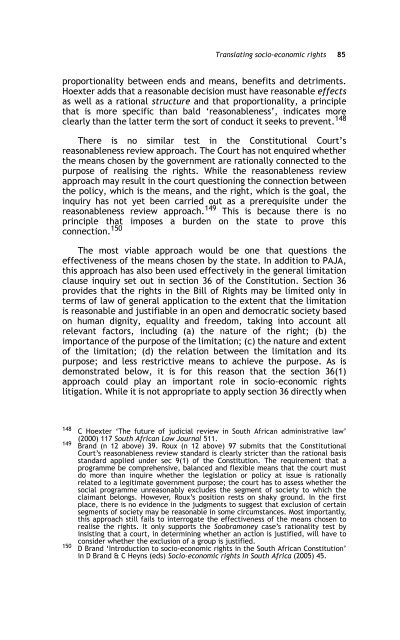LITIGATING SOCIO-ECONOMIC RIGHTS IN SOUTH AFRICA - PULP
LITIGATING SOCIO-ECONOMIC RIGHTS IN SOUTH AFRICA - PULP
LITIGATING SOCIO-ECONOMIC RIGHTS IN SOUTH AFRICA - PULP
Create successful ePaper yourself
Turn your PDF publications into a flip-book with our unique Google optimized e-Paper software.
Translating socio-economic rights 85<br />
proportionality between ends and means, benefits and detriments.<br />
Hoexter adds that a reasonable decision must have reasonable effects<br />
as well as a rational structure and that proportionality, a principle<br />
that is more specific than bald ‘reasonableness’, indicates more<br />
clearly than the latter term the sort of conduct it seeks to prevent. 148<br />
There is no similar test in the Constitutional Court’s<br />
reasonableness review approach. The Court has not enquired whether<br />
the means chosen by the government are rationally connected to the<br />
purpose of realising the rights. While the reasonableness review<br />
approach may result in the court questioning the connection between<br />
the policy, which is the means, and the right, which is the goal, the<br />
inquiry has not yet been carried out as a prerequisite under the<br />
reasonableness review approach. 149 This is because there is no<br />
principle that imposes a burden on the state to prove this<br />
connection. 150<br />
The most viable approach would be one that questions the<br />
effectiveness of the means chosen by the state. In addition to PAJA,<br />
this approach has also been used effectively in the general limitation<br />
clause inquiry set out in section 36 of the Constitution. Section 36<br />
provides that the rights in the Bill of Rights may be limited only in<br />
terms of law of general application to the extent that the limitation<br />
is reasonable and justifiable in an open and democratic society based<br />
on human dignity, equality and freedom, taking into account all<br />
relevant factors, including (a) the nature of the right; (b) the<br />
importance of the purpose of the limitation; (c) the nature and extent<br />
of the limitation; (d) the relation between the limitation and its<br />
purpose; and less restrictive means to achieve the purpose. As is<br />
demonstrated below, it is for this reason that the section 36(1)<br />
approach could play an important role in socio-economic rights<br />
litigation. While it is not appropriate to apply section 36 directly when<br />
148 C Hoexter ‘The future of judicial review in South African administrative law’<br />
(2000) 117 South African Law Journal 511.<br />
149 Brand (n 12 above) 39. Roux (n 12 above) 97 submits that the Constitutional<br />
Court’s reasonableness review standard is clearly stricter than the rational basis<br />
standard applied under sec 9(1) of the Constitution. The requirement that a<br />
programme be comprehensive, balanced and flexible means that the court must<br />
do more than inquire whether the legislation or policy at issue is rationally<br />
related to a legitimate government purpose; the court has to assess whether the<br />
social programme unreasonably excludes the segment of society to which the<br />
claimant belongs. However, Roux’s position rests on shaky ground. In the first<br />
place, there is no evidence in the judgments to suggest that exclusion of certain<br />
segments of society may be reasonable in some circumstances. Most importantly,<br />
this approach still fails to interrogate the effectiveness of the means chosen to<br />
realise the rights. It only supports the Soobramoney case’s rationality test by<br />
insisting that a court, in determining whether an action is justified, will have to<br />
consider whether the exclusion of a group is justified.<br />
150<br />
D Brand ‘Introduction to socio-economic rights in the South African Constitution’<br />
in D Brand & C Heyns (eds) Socio-economic rights in South Africa (2005) 45.
















